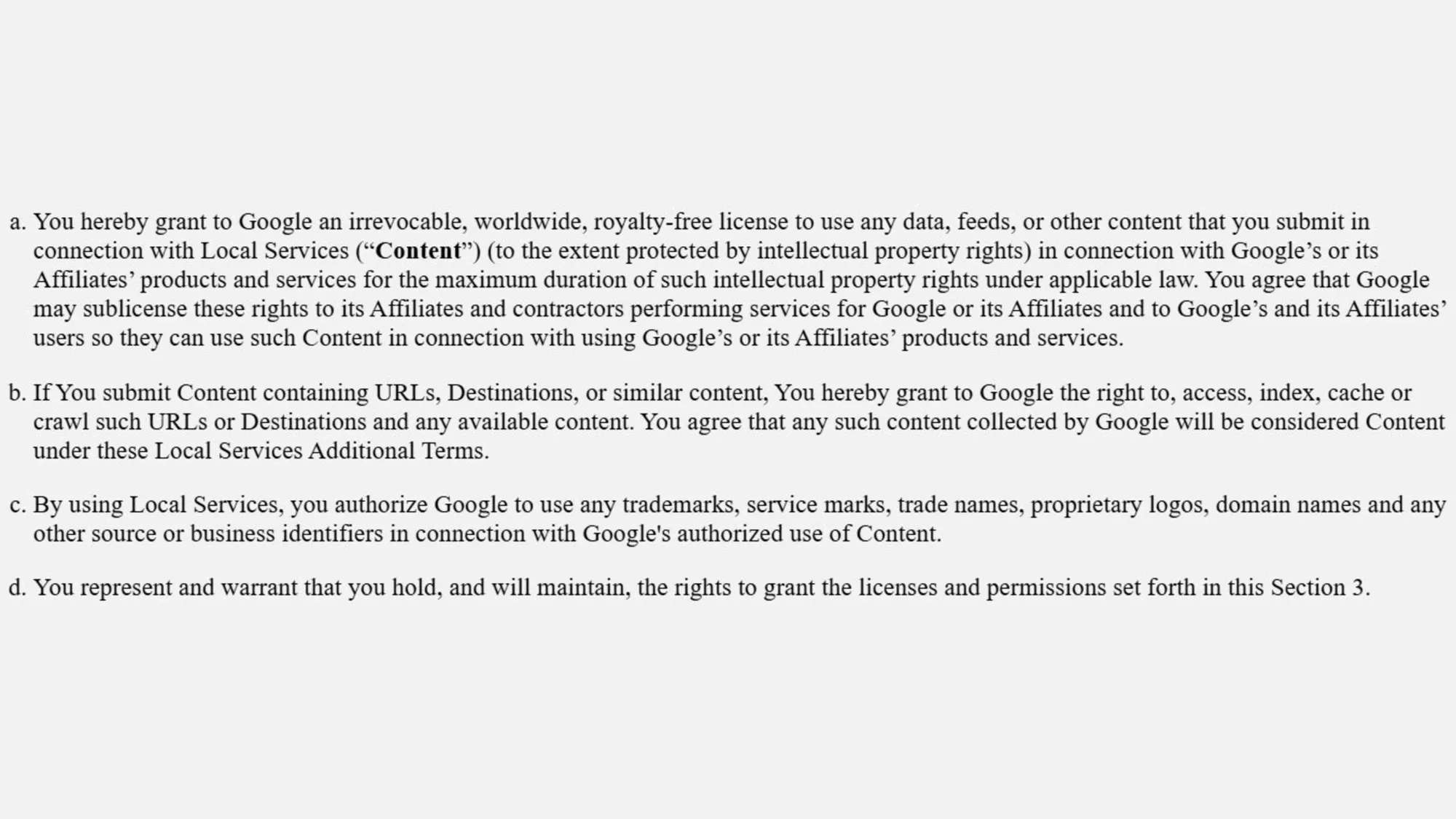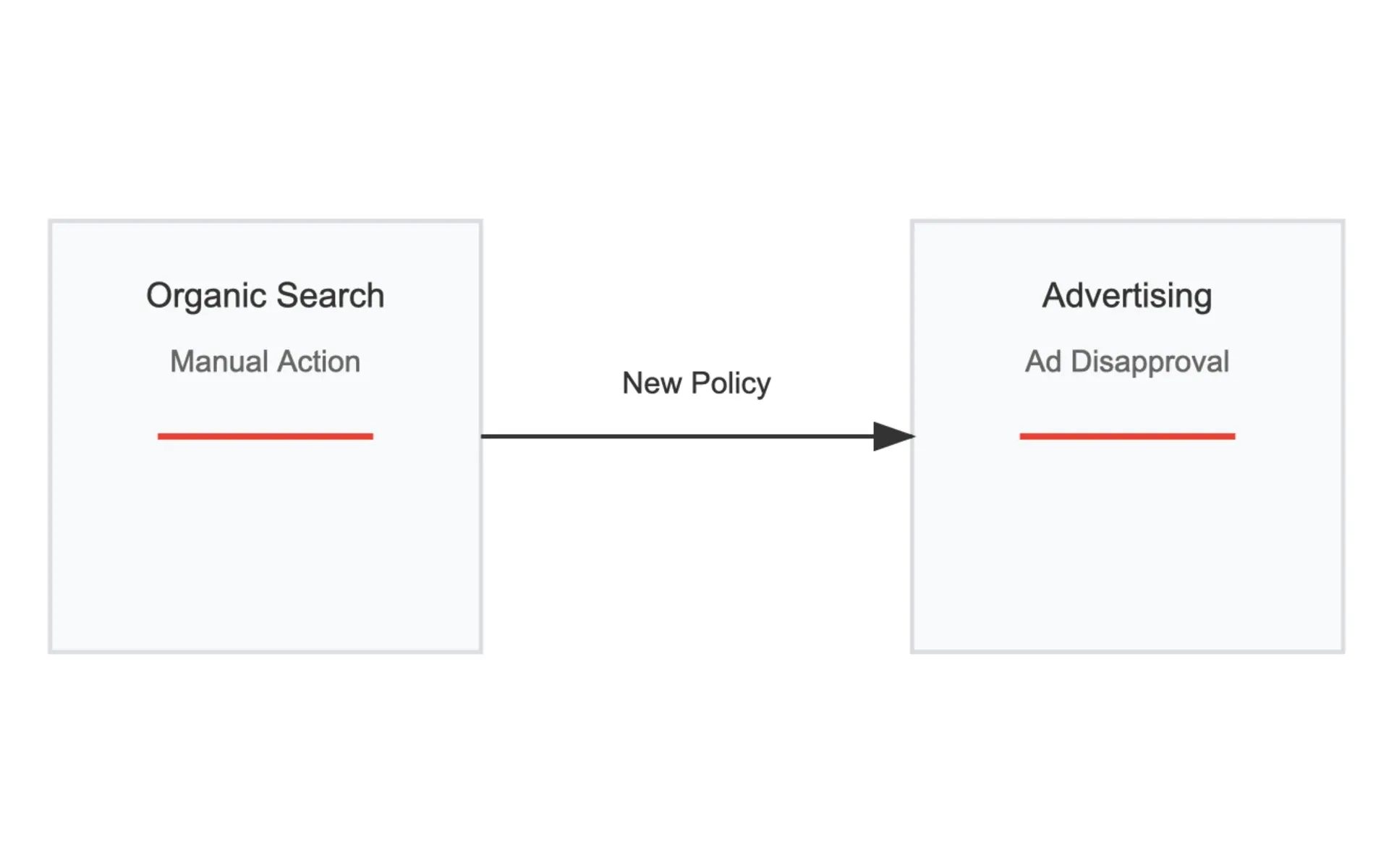Google updates Local Services terms granting content ownership rights
Google's March 2025 Local Services terms grant irrevocable content licenses, affecting advertiser data ownership and SEO practices.

Google implemented substantial changes to its Local Services Additional Terms for Providers on March 20, 2025, introducing new content licensing provisions that grant the company extensive rights over advertiser-submitted materials. The updated terms represent a significant shift from the previous version dated December 1, 2017, which contained no comparable content ownership clauses.
Get the PPC Land newsletter ✉️ for more like this
The most notable addition involves what Google defines as "Content" within the platform. According to the new terms, advertisers now "grant to Google an irrevocable, worldwide, royalty-free license to use any data, feeds, or other content that you submit in connection with Local Services." This licensing arrangement extends beyond the immediate platform usage, as Google reserves rights to utilize submitted content "in connection with Google's or its Affiliates' products and services for the maximum duration of such intellectual property rights under applicable law."
The March 2025 update introduces a mechanism that could trigger search engine reindexing of advertiser websites. The terms specify that when advertisers submit content containing URLs or destinations, they "grant to Google the right to, access, index, cache or crawl such URLs or Destinations and any available content." This provision creates a direct pathway between Local Services content submission and Google's web crawling operations.
The technical ramifications extend to how search algorithms may process and categorize business websites. When Local Services advertisers upload content that references their web properties, Google's systems gain explicit permission to perform comprehensive indexing operations. The collected material through this process becomes classified as "Content" under the Local Services framework, subject to the same licensing terms.

Expanded trademark and branding provisions
The updated terms establish broad permissions regarding business identity elements. Advertisers using Local Services now "authorize Google to use any trademarks, service marks, trade names, proprietary logos, domain names and any other source or business identifiers in connection with Google's authorized use of Content." This represents a substantial expansion from the 2017 version, which contained no equivalent trademark licensing language.
These provisions create a comprehensive framework where business branding elements become available for Google's use across its product ecosystem. The authorization extends to affiliates and contractors performing services for Google, as well as end users accessing Google's various platforms and services.
Get the PPC Land newsletter ✉️ for more like this
Data disclosure and transparency requirements
The March 2025 terms maintain existing data disclosure practices while operating under the new content licensing framework. Google continues its practice of sharing performance metrics with users and third parties, including response times, repeat customer rates, service duration averages, total services performed, and feedback ratings. According to the terms, "This information may also be made available on third-party websites."
The communication monitoring provisions remain consistent with the 2017 version. Google retains authorization to "access, monitor, and record telephone calls, text messages, live chat, and other communications initiated through the Programs." Advertisers must obtain necessary permissions under local law and notify team members about potential recording activities.
Payment processing and platform access
The updated terms establish that Google may provide various payment processing methods while maintaining discretion to modify these options. According to the document, "Google may add or remove payment processing methods at its sole discretion and without notice to you." Local Services platform pricing structures and related terms receive detailed coverage in the separate Local Services Platform Policies document.
Platform access depends on compliance with Minimum Provider Requirements, as described in the accompanying policy documentation. The terms state that advertisers must "provide honest, complete, and accurate information in connection with the Local Services platform, including to third parties." Verification processes focus exclusively on confirming compliance with these minimum standards.
Legal framework and dispute resolution
The Local Services terms operate within Google's broader advertising program framework, which mandates binding arbitration for dispute resolution rather than jury trials or class actions. The March 2025 update maintains this requirement while expanding the indemnification obligations to cover content-related claims.
Advertisers assume responsibility for defending Google against third-party claims arising from their content submissions, team employment relationships, or terms violations. The indemnification provisions specifically address liabilities that may emerge from user interactions, third-party complaints, and team member actions.
Employment and relationship classifications
The updated terms preserve existing employment classification requirements. Google employees and affiliates remain prohibited from providing services through the Local Services platform or contributing to advertiser teams. The terms explicitly state that platform participation does not create employment relationships between advertisers and Google or its affiliates.
Team member classification requirements demand compliance with applicable labor laws. Advertisers must ensure proper worker classification throughout their service provision activities, maintaining responsibility for team compliance with all applicable terms and policies.
Get the PPC Land newsletter ✉️ for more like this
Modification procedures and notification systems
Google reserves rights to modify the Local Services terms through a structured notification process. Changes receive posting at ads.google.com/localservices/provider/terms, with material modifications triggering direct notifications via email, push notification, or similar methods. According to the terms, "Changes will not apply retroactively and will become effective no sooner than seven days after they are posted."
Exceptions to the seven-day implementation period apply to changes addressing new platform functions or legal requirement modifications, which become effective immediately. The terms establish that continued platform participation combined with repeated change notifications may constitute acceptance of modifications.
Platform integration and account linking
The March 2025 terms introduce provisions for linking Local Services accounts with other Google products and services, particularly Business Profile on Google. This integration allows for data sharing across Google's ecosystem, with information provided during the Local Services onboarding process potentially appearing in connected accounts.
The integration framework supports Google's broader strategy of creating unified business presence management across its various platforms. Local Services data becomes available for use in connection with affiliated products and services, subject to the comprehensive licensing arrangements established in the updated terms.
Why this matters
These terms changes signal a fundamental shift in how Google approaches advertiser content ownership within its local advertising ecosystem. Marketing professionals managing Local Services campaigns now operate under a framework where submitted materials become subject to extensive licensing arrangements that extend far beyond the immediate advertising context.
The potential for automatic website reindexing through Local Services content submission creates new considerations for SEO strategy coordination. Marketing teams must evaluate how Local Services activities might influence their broader search optimization efforts, particularly when uploading content that references company web properties.
The trademark and branding authorization provisions require careful consideration of intellectual property management strategies. Companies using Local Services must assess whether the broad licensing terms align with their overall brand protection objectives and existing licensing arrangements with other platforms or partners.
For agencies managing multiple client accounts, the content licensing provisions create new liability considerations. The irrevocable nature of the licensing arrangement means that once content is submitted, Google retains perpetual rights to its use across its product ecosystem, regardless of future business relationship changes.
The integration with Business Profile on Google suggests that Local Services activities will increasingly influence broader online presence management. Marketing professionals must consider how Local Services optimization efforts coordinate with overall Google ecosystem strategy, particularly as account linking becomes more prevalent.
Timeline
- December 1, 2017: Original Local Services Additional Terms published with basic platform requirements
- August 30, 2024: Google announces integration of booking systems for Business Profiles and Local Services Ads
- January 6, 2025: Google removes key features for tax specialists from Local Services Ads platform
- January 14, 2025: UK Competition and Markets Authority launches investigation into Google Search dominance
- March 20, 2025: Major terms update introducing content licensing provisions (66 days ago from today)
- April 16, 2025: Google Ads API v19.1 introduces new Local Services feedback capabilities and enhanced lead management features
- May 20, 2025: Industry discussions emerge on social media regarding new content licensing implications (5 days ago from today)
- May 25, 2025: Current date for analysis of terms impact on marketing practices


